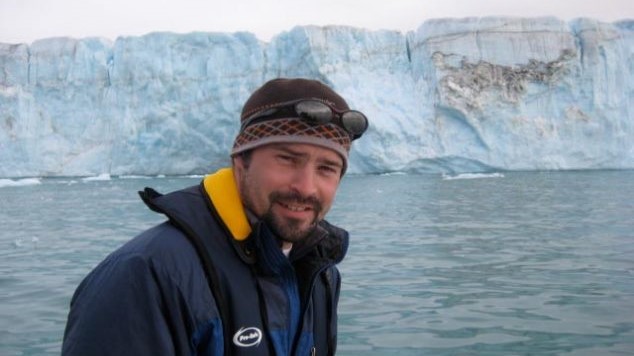
New Faculty: Seth Campbell
Seth Campbell joined the School of Earth and Climates Sciences and the Climate Change Institute as an assistant professor this fall.
What has your journey been to this point?
I completed a B.A. at the University of Maine in Farmington (1996-2001) and shortly thereafter, moved to UMaine. I never really left! I completed an MBA (2002-2006), B.S. (2008), M.S. (2010), and PhD (2014) at UMaine with my science degrees all being through SECS. I never thought I would actually return after my PhD as a faculty member in SECS but am proud to call it and CCI my home at UMaine!
Please tell us about your teaching and research interests.
Broadly, I use geophysical, remote sensing, and modeling methods to study the cryosphere (e.g. glaciers and permafrost) and near-surface geology of Earth. As it relates to the glaciers, I use these techniques to study the dynamical processes, thermal properties, and internal structure of glaciers as they change over time. I use similar techniques to estimate the depth, extent, and changes in permafrost relative to climate change or other influences (e.g. vegetation cover, topography). In regards to geology, I am interested in applying geophysical methods to studying the existence and origin of sedimentary and glacial deposits. Much of my research is focused on change detection: that is, I use field observations and models to understand how glaciers and permafrost have changed over time. I am also interested in determining how current glacier and permafrost change impacts other Earth systems such as down stream ecosystems and water resources.
When did you discover a passion for your specialty and what do you wish more people knew about it?
I was fortunate to have a father and a grade school science teacher mentor me on science path at an early age. My father was an environmental scientist and I recall participating in many trips with him to learn from his research. As long as I maintained good grades, it was common for me to skip school and join him on research efforts which included such activities as placing radio collars on beaver to determine their response to changes in water level fluctuations of hydro-power reservoirs in Maine. My grade school science teacher was a very interactive instructor and many of the lessons he taught in 7-8th grade, I re-learned in college, years later! Late in my high school and early college days, I became passionate about rock climbing and mountaineering. These outdoor activities merged naturally with my science interests into my current career which focuses on studying glaciers and permafrost around the world. So far my research has brought me to Alaska, Canada, Antarctica, South America, and Greenland. I’ve even brought my grade school science teacher on a glaciology field season to help him develop more science curriculum for the next generation of possible scientists!
What I wish more people knew about my specialty: I think the U.S. needs to take a more active role in training our grade school, high school, and college students in Earth systems science. I believe the complex relationships between glaciers, oceans, the atmosphere, and ecosystems should be focused on earlier in school. The cryosphere is a critical component of our planet and changes with the cryosphere can have a significant impact to local communities around the world, including Maine.
Why UMaine?
I am originally from the coast of Maine and have always had an interest in returning to the state because of all that it has to offer. My first experience at UMaine was NOT in the sciences; it was actually focused on completing my MBA at UMaine between 2002-2006. During that time, I worked at the Campus Recreation Maine Bound Adventure Center leading outdoor rock and ice climbing trips and teaching some KPE courses. I also volunteered for the University Volunteer Ambulance Service as an EMT. Through those experiences, I experienced the strong sense of community that UMaine provides and I am still close to many faculty, staff, and students from these earlier days at UMaine. As a student I continued on in the School of Earth and Climate Sciences (SECS) through my MS and PhD. Again the sense of community within SECS was a significant draw as was the opportunity to conduct research in remote mountain environments around the world. Now that I have been in my career track for a decade, it has become evident to me that very few public institutions provide their science students so many field research opportunities as SECS does. The strong community and opportunities have become my greatest draw to UMaine.
What are your predictions for your field in the near future?
I think cryosphere research is a small, yet evolving and very important field of study because glacier and permafrost change can have such a tremendous impact on the global population and even local communities here in Maine. For example, sea level rise, an influx of fresh water into oceans from melting glaciers, and associated trickle down effects to ecosystems, economies, and local communities, are a very real global and local concern. Earth’s climate, glaciers, oceans, and ecosystems are all closely related in a complex web.
Understanding how Arctic changes to any of these systems, and how these changes will influence New England (including Maine), I suspect will become an important focus of my research in the near future.
